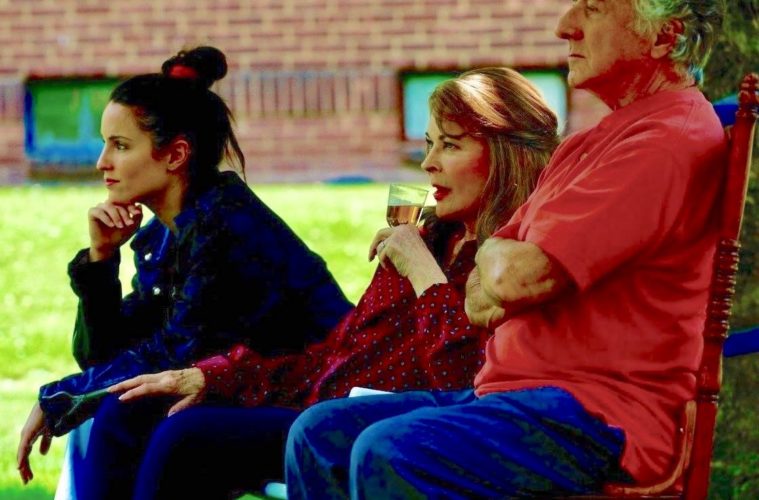 America’s reigning middlebrow geek queen, and certainly the only doctor of neuroscience to become a multimillionaire as a sitcom star, Mayim Bialik is now making films, and her first, As They Made Us, is predictably about herself. Or, more precisely fictionalized version of herself (Dianna Agron), who is primarily consumed with watching her phenomenally aggravating parents struggle as they face infirmity and death.
America’s reigning middlebrow geek queen, and certainly the only doctor of neuroscience to become a multimillionaire as a sitcom star, Mayim Bialik is now making films, and her first, As They Made Us, is predictably about herself. Or, more precisely fictionalized version of herself (Dianna Agron), who is primarily consumed with watching her phenomenally aggravating parents struggle as they face infirmity and death.
Like we needed another one of those movies. You may have noticed how things like this have been running in one long generational cycle, according to where Hollywood’s late-Baby Boomer/early-Gen X contingent are in their lives. As budding baby-makers, they showered us with movies about the wonders of new parenthood in the 80’s and 90’s. In the early ‘00s it was dramas and comedies about the discomfort of middle-age. Now, they’re generating reams of films about watching their elderly parents blink out and fade away. A wave of old fart sagas a decade or two hence awaits us, because why wouldn’t we be fascinated.
Bialik is a little young (46) to be joining this black parade, but she’s got the bad family cred to make it work – reportedly, the film was originally titled As Sick as They Made Us, which may have been giving the farm away. Here, Agron’s Abby is a divorced magazine writer whose primary crucible (her two young kids are easy-peasy) is not quite the genuine physical decline of her father (Dustin Hoffman), but the often barbaric insensitivity and narrow-minded narcissism of her mother (Candice Bergen). With nail-head-hitting childhood flashbacks that have little of the actor-y fluency of the rest of the film, a rough sketch of relentless parental dysfunction plays out, piling evidence for the prosecution as to why Abby’s older brother Nathan (Simon Helberg as an adult) left 20 years earlier and never came back.
The film is sprinkled with moments of sensitivity, but in a traditional pop-culture way that sometimes feels outrageously nasty today, Bialik plays the tortured and torturous characters mostly for laughs, with family fights that range from quirky banter to abusive behavior so vicious it feels like an over-reach, crazy moments from a broader farce plugged into this otherwise realist story. At one point Bergen’s harridan – played with Lainie Kazan-like zeal – stops her ailing husband’s birthday party dead by stubbornly mashing cake into his prone face, and even if something like this happened in Bialik’s family, on film it crosses the line into Gothic melodrama.
In fact, Bialik announced the film as her way to cope with having grown up “around mental illness” – a factor never explicitly expressed in the film, and which might explain the strained detours into foul-mouthed malevolence. That said, Bialik has been in front of cameras long enough (since she was 11, starting with the titular Blossom, then later as a nerd on The Big Bang Theory and most recently, a host of Jeopardy) to have a solid idea of when to leave an actor like Hoffman alone with his ideas. Watching this maestro, in the seventh decade of his career, surrender his lifeforce and go slack is often depressingly convincing.
One hefty scene, between Agron and Helberg in a busy college corridor, discussing his adamant separation from his parents, is taken in one long shot, and it suggests a real filmmaker amid the self-pity and errant fits of overbearing-mom yocks. A Hollywood-averse truism rears its ugly head: that after a certain age, there’s little point in trying to heal some toxic parent-child relationships.
It’s a small relief that dementia doesn’t factor into Bialik’s mix, just some other unnamed mental malfunctions. It’s also, by the way, the first feature co-produced by Chicken Soup for the Soul, which might be off-brand – the takeaway includes a ration of realistic warmth but also a certain amount of head-scratching.
Advertising disclosure: We may receive compensation for some of the links in our stories. Thank you for supporting LA Weekly and our advertisers.

